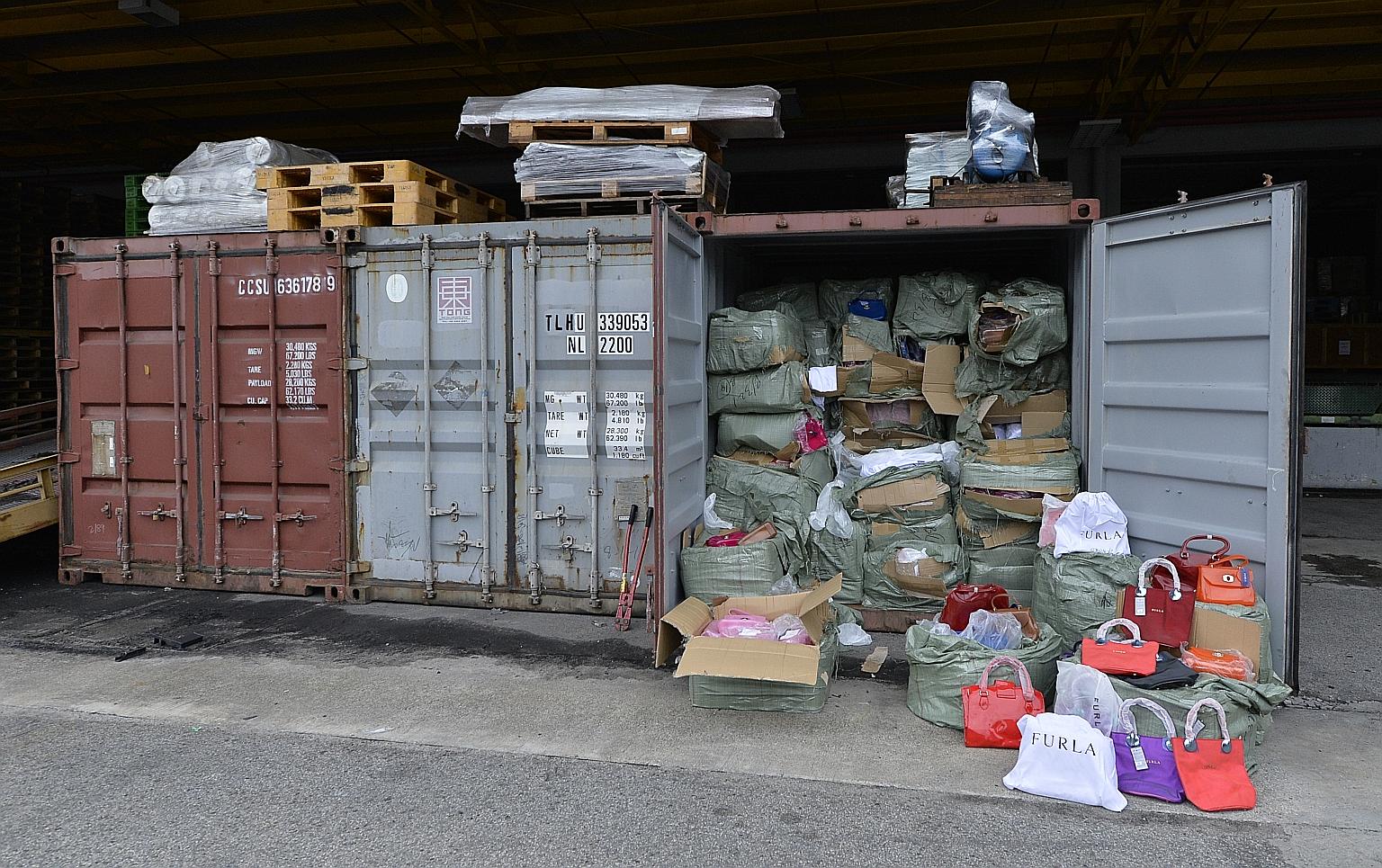Freight forwarder cleared of shipping fakes
Apex court rules it was merely providing a service and unaware the goods were fakes
Sign up now: Get ST's newsletters delivered to your inbox

The case goes back to April 2013, when Singapore Customs seized nearly 31,000 fake items, including China-made fashion accessories, that could potentially have sold for over $1 million.
ST FILE PHOTO
Luxury brands Burberry and Louis Vuitton have failed in their attempt to hold a freight forwarder liable for trans-shipping fakes in two 40-foot containers from China to Batam through Singapore.
In a ruling of industry-wide import, the Court of Appeal drew a line between effective enforcement against fake goods and holding "honest commercial persons" liable who were unaware the goods were fakes. It held, in judgment grounds last week, that "there ought to be some limiting principle that distinguishes those who were truly using the sign for their economic benefit and those who were unknowingly facilitating these acts by merely being the conduit in the movement of the goods in question, for instance cross-border services".
Judge of Appeal Tay Yong Kwang, writing for the court, which included Judges of Appeal Andrew Phang and Judith Prakash, said enforcing intellectual property rights had to be balanced against over-extending liability to those who were "wholly unaware" of the infringing sign.
The trademark proprietors of Burberry and Louis Vuitton had sued Singapore-based Megastar Shipping for trademark infringement in importing the counterfeit goods by sea.
The case goes back to April 2013, when Singapore Customs, inspecting two 40-foot containers, seized nearly 31,000 items, including China-made bags, shoes, belts and other fashion accessories - all fakes that could potentially have sold for over $1 million.
They had been shipped from China to Singapore for onward passage to Batam in smaller vessels as the Batam port was too shallow for large container vessels. In Singapore, the containers had to be unloaded and reloaded onto smaller "feeder" vessels.
The trademark owners failed in their suit against Megastar in the High Court in December 2017 and appealed to the apex court.
Their lawyers, led by Mr M. Ravindran, argued that Megastar should be considered the importer as well as the exporter or would-be exporter of the fakes, and was liable under the Trade Marks Act.
Megastar's lawyers, Mr Leonard Chia and Ms Jasmine Dhanaraj, contested the claims, countering it did not use the signs in the trademark sense and was only providing a freight-forwarding service.
Given the novelty of the legal issue, the court appointed Singapore Management University law professor David Llewelyn as amicus curiae - friend of the court - to address relevant questions.
The court found there was no evidence that Megastar knew or had reason to believe those trademark signs were on the sealed goods as the documents given to it indicated only household goods and other seemingly innocuous generic merchandise.
There was no evidence that luxury products were included in the cargoes.
The court found that Megastar was merely providing a commercial service as freight forwarders in its ordinary course of business and nothing more.
To impose liability for trademark breaches on Megastar based on the facts would be against the letter and the spirit of the Act, said the court in dismissing the appeal with costs. "It would seem like a case of needing to make someone liable because the real culprits are not identifiable or reachable," said the court.
Intellectual property law expert Martin Schweiger, who operates here and in Munich, said the decision has major industry impact as it "sets a reasonable bottom line for the liability of freight forwarders and other service providers in the logistic-handling chain". "This is a relief for freight forwarders that handle shipping containers in transit, without opening them," he added.
"Singapore is now very similar to the standards in the US, Europe and many other countries."


